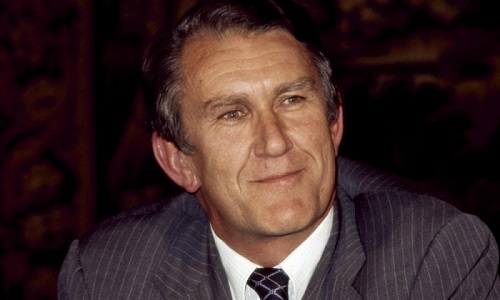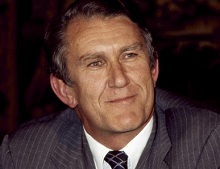Former prime minister Malcolm Fraser has died aged 84. Here he is in his prime:

Former PMs have had nice things to say. Here’s Paul Keating:
“I always thought Malcolm would be around a lot longer. I must say, I wished he had been.
“Notwithstanding a controversial prime ministership, in later years he harboured one abiding and important idea about Australia – its need and its right to be a strategically independent country.
“His public life also enshrined other important principles: no truck with race or colour and no tolerance for whispered notions of exclusivity tinged by race. These principles applied throughout his political life.”
The same article summed his contribution as follows:
In office, Fraser was a staunch conservative on economic policies, an opponent of deregulation – and he was was criticised by his colleagues for lacking reform zeal. But he continued many of Labor’s progressive reforms.
In 1976 he established the family court of Australia and federal court of Australia; granted the Northern Territory self-government; passed the Aboriginal Land Rights (Northern Territory) Act; created the position of federal ombudsman and established the ABC’s FM radio service. The next year, he established the National Aboriginal Conference and SBS.
In 1979 the Fraser government established the Australian Refugee Advisory Council to advise it on the settlement of refugees – many of whom had been arriving as “boat people” from Vietnam since 1978.
After criticising the Liberal party’s direction during the years of the Howard government, Fraser finally quit the party when Tony Abbott came to the opposition leadership, unhappy with Abbott’s rejection of emissions trading. He said the Liberal party was no longer a liberal party but instead a conservative party.
Fraser campaigned assiduously for human rights and attacked the party’s stance on immigration and refugees.
Economics was perhaps his weak spot. Richard Holden summarises:
Australia can be justifiably proud of an approach to economics that is squarely between Europe and the United States. The US, on the whole, champions free enterprise despite the social costs; Europe sees a much larger role for the state, even if that inhibits free enterprise. The Australia in which we live today is somewhere in between.
When Malcolm Fraser became prime minister that was all up for grabs. We could have become “old Euope” or veered onto a radically individualist path in response to the debacle that came before. Fraser helped us chart a middle course, and we should be very grateful for that.
Perhaps he wasn’t quite up to the challenge, but he had a steady hand and did no great harm. The Guardian has a suite of articles, the titles of which tell a story:
Malcolm Fraser’s steady hand is in stark contrast to Tony Abbott’s chaotic manoeuvres Lenore Taylor
Malcolm Fraser had no Damascene conversion – he always championed human rights Katherine Murphy
Malcolm Fraser, a leader who believed there is a moral compass in our nation’s life Fred Chaney
Malcolm Fraser dared to dream of a truly original Australian foreign policy Margaret Simons
Fraser’s great conservative achievement: cementing Whitlam’s progress on race Robert Manne
Fraser’s politics didn’t shift much after 1975, but the rest of Australia’s did Julian Burnside
Tributes roll in – a prime minister who won three elections remembered
Malcolm Fraser: Australia’s former prime minister – in pictures
Fraser was ruthless in gaining power, first in the coup that unseated Gorton as PM, then doing over Billy Sneddon for the Liberal leadership and later in the famous dismissal of the Whitlam government. I hated him tribally for that, and disliked him for his apparent aloofness and arrogance, but later came to see him as a man of principle and values.
There’s more on his legacy at the ABC and heaps of articles just about wherever you look!
Probably the best article that takes you to the complexity of the personality and his politics is Guy Rundle at Crikey, unfortunately paywalled.
A remaining mystery is what really happened that night in Memphis, when Fraser turned up in the foyer of a seedy hotel without his trousers.
Update: Must read on Fraser at The Piping Shrike.


Frazer’s tragedy was to be the wrong man for his economic times. Economic times where one of the key problems was stagflation brought on by the OPEC crisis.
The core of the stagflation problem was a strong union movement that believed that the wage gains that they made must be protected from loss of real value due to inflation no matter what was happening to the price of oil. What was needed under these circumstances was a leader who could establish an accord with the unions, an accord where wage rises could be slowed or even reversed under the circumstances that Australia was facing during the Frazer era.
Frazer was the wrong man to get the cooperation of the unions. He didn’t help himself by being a rich man who said “life wasn’t meant to be easy” and he was doubly cursed by the way he came to power and the scandalous way that he was given the power to block supply by Askin and Joh.
Ben Eltham has a thorough and competent review of Fraser’s life and work. He says the Liberal Party has drifted right as Fraser drifted left. They parted company, so Fraser has left no legacy in conservative politics.
Max Chalmers gives six on Fraser’s best quotes on refugees and immigration.
Brian: The dismissal shocked Australians because it broke conventions. The good news was that it resulted in changes that would have prevented Frazer, Askin and Joh doing what they did. The Senate can no longer block supply and replacement Senators have to be the person selected to replace a senator dies or resigns is selected by the the relevant party organization, not the premier of the time.
The Frazer government gained power at the end of a long period where both sides of politics was moving to the left hence our surprise re many of Frazer’s attitudes. Both parties went downhill after that.
.
‘Must read’ on Fraser at The Piping Shrike.
Brian: I like the way the Piping Shrike put Frazer in context. We tend to forget that, when Frazer entered politics communism was expanding, still monolithic and not giving up anything it grabbed. This is one explanation of why Kennedy got into Vietnam, Nixon seized the opportunity to start making friends with China and why the West decided to stop supporting white colonials.
Just how much of this contributed to what Frazer did and how much was driven by what Frazer thought was right is anyone’s guess.